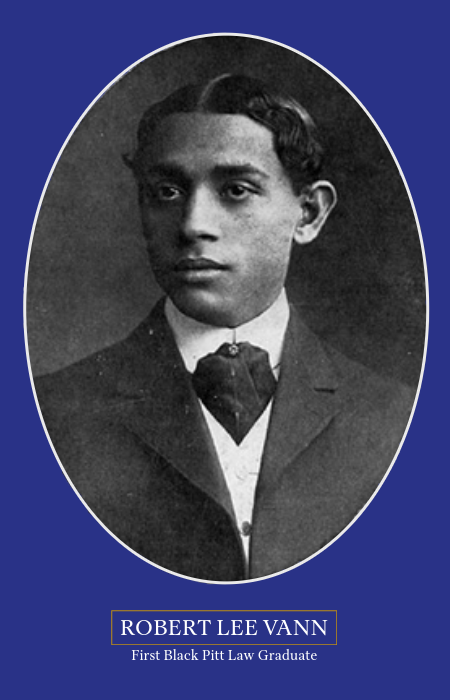
Robert Lee Vann: First Black Pitt Law Graduate
Robert Lee Vann made history as the first Black graduate of the law school in 1909, also serving as the first Black editor of the student newspaper The Courant. Born on August 27, 1879, in Ahoskie, Hertford County, North Carolina, his educational journey began after saving enough money to attend Waters Training School in Winton, where he graduated as valedictorian in 1901. He then attended Wayland Academy in Richmond and Virginia Union University before receiving a scholarship to Western University of Pennsylvania in 1903, where he earned both his undergraduate and law degree. Throughout his time in law school, Vann worked in a railroad dining car from Pittsburgh to Connellsville to finance his education, serving dinner in the evening and breakfast on the return trip the next morning. When he passed the bar exam in 1909, he was one of only five Black attorneys in Pittsburgh, opening his own law practice the following year.
In 1910, Vann's career took a significant turn when he became the legal counsel for The Pittsburgh Courier to supplement his income. Within months (and following the departure of the original founder Edwin Nathaniel Harleston for financial and creative reasons), he rose to become the paper's editor, treasurer, and publisher, transforming it into one of the era's leading Black newspapers. Under Vann's leadership and connections, the Pittsburgh Courier became the most influential Black newspaper in the country, with a circulation of 250,000 in the 1930s and nearly 400,000 by 1947. The paper was distinguished by its coverage of the 1936 Olympics in Nazi Germany, Italy’s invasion of Ethiopia, and Joe Louis’s boxing career, as well as columns by prominent Black leaders such as W. E. B. DuBois and Marcus Garvey. Vann's efforts also brought legitimacy to the Courier, establishing a professional staff, attracting national advertisements, establishing a dedicated printing plant, and ensuring wide circulation.
Using the editorial pages to advocate for various social and political reforms, the Pittsburgh Courier made Vann a political force throughout the nation. Vann served as the fourth assistant city solicitor in Pittsburgh from 1917 to 1921, which was the highest position held by an African American in the city government at that time. In 1921 and again in 1927, he ran unsuccessfully for the Allegheny County Court of Common Pleas. Initially a Republican, Vann served as an alternate delegate to the national convention in 1920 and as an alternate delegate-at-large in 1924. However, he became disappointed with the Republican administration in the 1920s by his treatment, disheartened by the disarray of the party, and became troubled by the economic challenges faced under President Hoover. Consequently, in 1932, Vann officially put the Courier behind the party realignment of African Americans, urging Black voters to "turn the picture of Lincoln to the wall" as he shifted his allegiance to the Democratic party, embracing Franklin D. Roosevelt's New Deal and pleading support in the 1932 election. This support led to Vann being appointed as a special assistant to the U.S. attorney general Homer Cummings from 1933 to 1935, leaving due to his mistreatment from staff, who often refused to take dictation from him because he was Black. Additionally, in 1935, he actively campaigned for the enactment of an equal rights law in Pennsylvania, giving African Americans access to places of public accommodation.
By the time of his retirement in 1936, Vann had built a successful legal practice with a legacy that extends far beyond his accomplishments in law and journalism. His dedication to social justice, advocacy for civil rights, and commitment to uplifting African American voices have left an indelible mark on American history. Robert Lee Vann's life is a testament to the power of leveraging education and influence for change. His pioneering spirit and unwavering determination continue to inspire generations to strive for Black empowerment, excellence, and equity.
